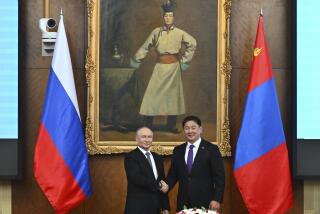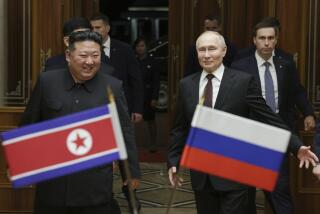Chechen War Propels Putin to Front Ranks
MOSCOW — Acting President Vladimir V. Putin took delivery Friday of an innocuous-looking black attache case that is the most potent symbol of Russian power: the case containing the codes to launch the nation’s nuclear missiles.
The delivery of the black case by an unsmiling plainclothes official symbolized the dramatic transfer of power from President Boris N. Yeltsin, who resigned earlier in the day after eight years in power.
With Putin now the man in control and well-positioned to win the presidency in elections expected to be held in March, the West will be watching carefully to see if he softens the tough nationalistic and militaristic stance that has made him so popular in Russia.
Putin was a colorless official when he became prime minister in August, but in less than six months he has forged an image as Russia’s strongman. In various media stunts, he strutted in a judo outfit, co-piloted a fighter plane over war-torn Chechnya and threatened to destroy that republic’s rebel leaders wherever they were.
“We will pursue the terrorists everywhere. You will forgive me, but if we catch them on the toilet, we will wipe them out in the outhouse,” he said in September in what for most Russians is his most memorable quote.
Putin has become most identified here and in the West with Russia’s latest war against Chechen separatists. The conflict appears to be more brutal and ruthless than the 1994-96 Chechen war that damaged Yeltsin’s reputation, and it has Russians feeling like winners again.
The conflict has given Putin an air of victory, and his rise from secretive back-room man to leader has been meteoric.
He was pushed forward in August as a front man for The Family, the powerful group of Kremlin insiders surrounding Yeltsin and his relatives. One of Putin’s first moves was to issue a decree guaranteeing the retired president immunity from prosecution, and Yeltsin’s inner circle may hope, through him, to maintain its influence and avoid prosecution for alleged corruption.
But if elected in March, Putin will be his own man, able to freely exercise the enormous powers vested in the presidency by the Russian Constitution that Yeltsin imposed in 1993.
By Western standards, Putin is a man devoid of charisma. His demeanor is dour and gruff, and his rare smiles seem forced and unnatural. A former neighbor said Putin was the kind of man who frightened children.
But Russians like his toughness, his certainty and his occasional coarse language.
In recent years Yeltsin cast about for a potential heir, embracing and dumping successive prime ministers. Putin emerged as the right man because he was tougher, sharper and more ruthlessly determined than the rest.
First, he followed tough talk with tough action in Chechnya, making an issue that had long been painful for the Kremlin a sudden winner. Putin was able to galvanize a nation adrift by reigniting the flame of nationalism and reviving Russians’ belief that theirs is a great world power.
Putin’s defiance toward U.S. and European criticism of the war in Chechnya played on anti-Western sentiment and revived Russia’s sense of pride.
Second, in a nascent presidential contest that had been dominated by the Kremlin’s rivals, Putin was primarily responsible for pushing to prominence a new bloc, Unity, that undermined his main challenger, former Prime Minister Yevgeny M. Primakov of the Fatherland-All Russia movement. Primakov, fired by Yeltsin in May, was the country’s most popular politician--until Putin came along.
Under the leadership of Sergei K. Shoigu, Unity performed well in Dec. 19 parliamentary elections, a clear signal to the Kremlin that Putin had passed the most important test. According to recent polls, Putin’s popularity had risen to well over 50%. Everything was in place, and there was nothing left to do but hand over the reins.
Not all here believe that Putin’s election to a full term is assured. Among the doubters is former Soviet President Mikhail S. Gorbachev.
“Putin is holding on thanks to his mystery. Mysterious appearance, mysterious glance, mysterious phrases,” Gorbachev said Friday. “But it so happens that the man opens his mouth and has nothing to say.”
Putin, 47, is often described in Western media as resembling a Soviet spy straight out of central casting. It’s a role he played at the beginning of his career.
“They offered me work in state security, and I accepted at once,” Putin said in a July 1998 newspaper interview, describing his recruitment in 1975 during his final year at Leningrad State University. He rose to the rank of colonel in the KGB, the Soviet-era spy agency.
From the early 1990s, he worked as an aide to Anatoly A. Sobchak, chairman of the City Council and later mayor. After Sobchak lost a reelection bid in 1996, Putin joined Yeltsin’s presidential staff and in 1998 was named chief of the Federal Security Service, the main successor to the KGB.
For the West, Putin’s strong power base in the military and security organs and his nationalistic rhetoric are cause for some concern. Putin has warned ominously about foreign threats to Russia while promising to boost military spending, and he has praised the KGB for protecting Russia’s interests.
But the real test, in the eyes of the West, will be whether Putin lives up to his reputation as a supporter of continued liberal market reforms. He has ruled out renationalizing the economy--good news for elite oligarchs who grew rich during privatization by gaining control of former state assets. And he plans to soon release his economic program, which will be carefully examined in the West.
If Putin falters in pursuing liberal economic policies and supporting democratic ideals, Western tolerance for his nationalistic rhetoric may quickly evaporate, causing a further deterioration in Russia’s relationship with the West.
Putin pays lip service to the development of democracy in Russia, but he does not appear to be an instinctive democrat.
Although Putin’s campaign funds are likely to come from Russia’s powerful oligarchs, as president he will have enormous power to act as he sees fit. Only as he begins to wield that power will the nature of his presidency become clear.
More to Read
Sign up for Essential California
The most important California stories and recommendations in your inbox every morning.
You may occasionally receive promotional content from the Los Angeles Times.










